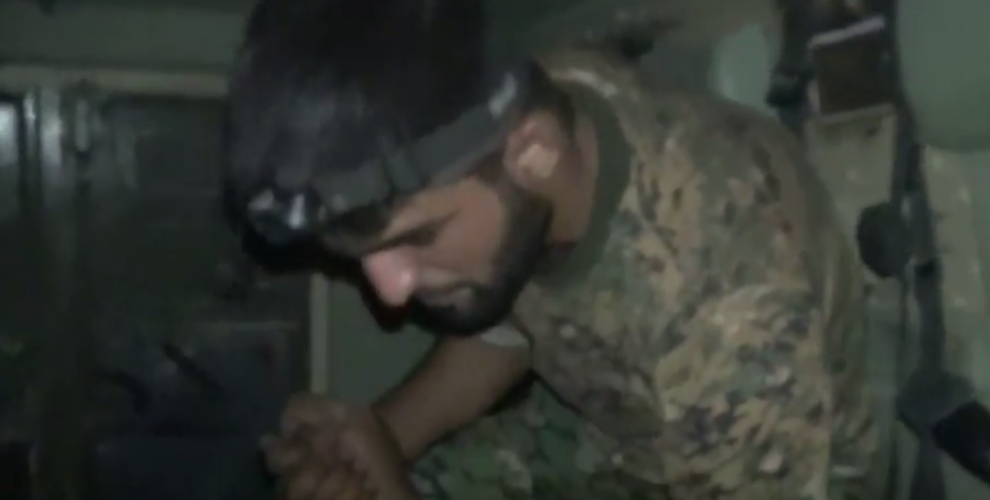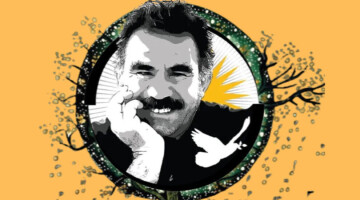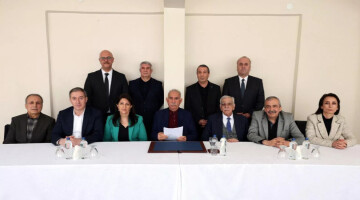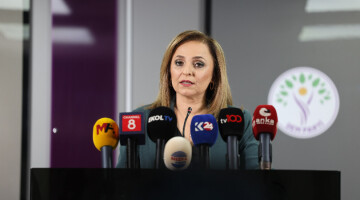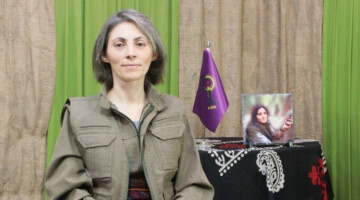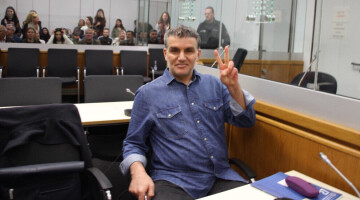The BKC-shooter of the panzer, Delîl, bestirred himself to keep everything outside under control as long as they were still on dangerous grounds, and on the other side tried hard to boost the morale of his injured comrade and to keep him awake at all costs. Delîl was clutching the hand of his bleeding comrade, who suffered wounds on his stomach and hand and kept on talking to him continuously to prevent him from falling senseless.
On the eastern front line of Raqqa big hustle commences every morning as soon as the sun rises. Everything is coordinated with much discipline and a cleverly organized system. The offensive units, reinforcements, logistics, emergency units, they all are getting prepared. 200 metres from the front line armoured vehicles have parked to fetch the wounded and the martyrs. In the Raqqa city houses are at close quarters and the alleys lie tightly together. Especially in Raqqa's historic district, within the historic walls the side streets are extremely slim and the houses consist predominantly of two or more floors. These neighbourhoods are therefore the most embattled zones of all, since ISIS gangs choose mainly such tight places to hide and position their snipers. In addition the fighters are not able to enter these neighbourhoods with their vehicles, which are only deployed to pick up the wounded comrades and the martyrs, let alone ambulances. On the one hand because the streets are simply too narrow, and on the other hand because such surroundings offer ISIS gangs ideal attack options, the only vehicles that can come at closer range are the panzers.
It is in fact not allowed for journalists to enter the war zone at night. However sometimes exceptions are made, as panzers are escorting us. When the panzer crew jumped out to get the wounded, we asked them to take us with them. After being issued the permission by the commanders of the units, we were allowed to move with the unit. We sat tight with the group, and suddenly a cracking voice came from the radio reporting of a wounded fighter. The panzers set out, and we with them.
When we reached the location, the wounded fighter had already been secured from the battle field. To get him out of there, they used old rusty iron railings. With utmost caution the wounded was heaved into the panzer and taken together with us away. But the panzer could move only slowly due to the debris scattered all around.
Delîl, the BKC shooter, tried -as long as we were still on dangerous grounds- to keep his eyes on the outside and simultaneously boosted his wounded comrade's morale and kept him hard from falling asleep. The fighter with the name Berxwedan (Resistance) had suffered injuries on his stomach and hand. His wounds were grave and he lost already way too much blood. If he would pass out now, it would be life-threatening.
Delîl kept on repeating to him: "Berxwedan, berxwedan jiyan e" (Resistance, resistance is life), now come and laugh for us". The wounded replied with a smile he could offer amidst the raging pain he suffered from: "How shall I manage to laugh". But Delîl did not let go of him and kept on making him talk, as he was still standing and operating the heavy artillery piece. The moment they left the dangerous zone behind, Delîl finally sat down and clutched the hand of his wounded friend, starting to talk with him. He talked about all the places they were together at in the past. He said: "Do you remember Mekmen? What a nice place that was, wasn't it? What did you like most of Mekmen, its battle or its dust?" His wounded comrade replied: "Both were nice". During all the way Delîl held his hand tight.
As soon as we reached the checkpoint, first aid was provided for the wounded fighter before he was transferred to the city's hospital. Later we were told that the wounded fighter was in a stable state and his life was out of danger.

